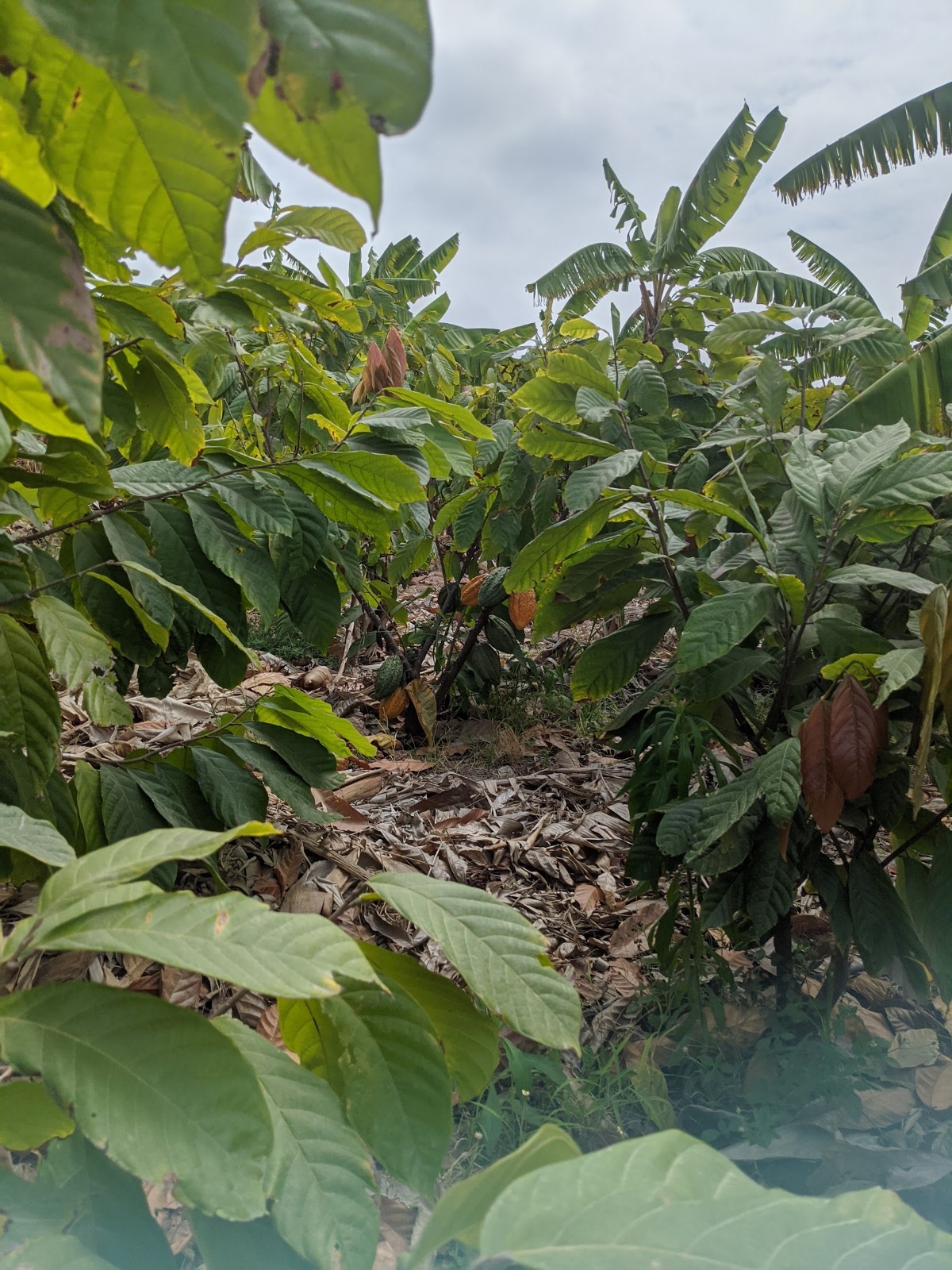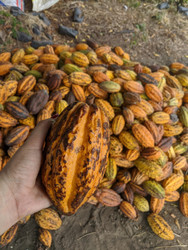Jul 18th 2022

Supporting our mission: education finding more eco-friendly solutiuons in farming
The population is increasing, it is imperative to secure good farmland for food supplies. To add to the problem, the continued use of inorganic fertilizers decreases soil fertility and leads to lower yields. Using biochar from eco-friendly cocoa products can enrich the soil, eliminating the need for artificial fertilizers. Farmers can engage in sustainable farming using biochar to meet the growing demand for food.
Besides preserving soil moisture and fertility, biochar eliminates greenhouse emissions to create a sustainable environment.
What is Biochar?
Biochar is a charcoal-like solid produced by burning organic material (biomass) such as agricultural wastes in a process known as pyrolysis.
Pyrolysis is the thermal decomposition of organic material at very high temperatures (above 400℃/752℉) with very little or no oxygen. Biochar can be made through small-scale production with customized stoves or kilns or large-scale production with larger pyrolysis plants.
Biochar is black with a high carbon content of about 60%-90% - hydrogen, oxygen, and nitrogen comprise the remainder of the percentage composition. The product is fine-grained, highly porous, and lightweight with a large surface area.
Sources of Biochar
Although energy crops such as corn, switchgrass, etc., have been assessed for biochar production, most research trials have used waste products such as animal manure and agricultural and forestry residues.
For this particular project, engineering students from the Environmental Club of Stanford University used cocoa husks donated by CocoaSupply to produce biochar for cocoa farms. The aim was to address soil sustainability on cocoa farms by converting the discarded husks into biochar and using it to improve the soil.
Benefits of Biochar as a Soil Enhancer
Biochar Enriches the Soil and Retains Water and Nutrients
Using biochar as a soil amendment is a technology dating back to the Amazon, two millennia ago. Indigenous people created zones of fertile soil through cooking fires, kitchen debris, and deliberately leaving charcoal in the ground. These rich soils are known as terra preta (dark earth).
The terra preta were characterized by their high carbon content. They are more fertile than the surrounding infertile soils of the Amazon.
Due to its physical and chemical nature, biochar can be said to be soil’s best friend. It attracts and holds moisture and increases soil cation exchange capacity (CEC). CEC is the degree of a soil’s ability to retain and supply nutrients to plants. Thus, biochar holds even the most often leached nutrients - nitrogen and phosphorus.
Recent research has proven that biochar reduces a soil’s carbon dioxide (CO2) and nitrous oxide (N2O) gas emissions by 50-80%. This reduction is vital for the production of eco-friendly cocoa.
Biochar Encourages Symbiosis between Plant Roots and Micro-organisms
Biochar’s large surface area and porous nature provide a habitat for microbes and fungi. The symbiotic relationship developed between some fungi and plant root fibers results in higher nutrient uptake by plants.

Biochar is Persistent in the Soil
Biochar is the most persistent form of organic matter that can be applied to the soil for more than 2500 years. When buried, it withstands chemical and microbial degradation.
Although it hardly adds nutrients to the soil, biochar’s water and nutrient-retention properties render fertilizer unnecessary for centuries.
Biochar Enhances Crop Yield
Biochar increases food production and sustainability. It is particularly beneficial in areas with limited organic resources, inadequate water, and depleted soils. Studies have established that biochar added to poor and low-carbon soils can increase crop production up to four times.
Other studies have also found that biochar increases crop yield by 15% when used alongside inorganic fertilizers.
Why is it Important to Use Waste Products in Agriculture?
Using agricultural waste products is crucial for agricultural development, energy structure, and environmental protection.
If the wastes are left to decompose on their own, they release more gasses, causing environmental pollution.
Biochar plays a role in the development of a sustainable agricultural system and promotes positive climate change. The impact of biochar on various ecosystem functions indicates that it holds a key to the solutions of carbon storage, energy, and ecosystem functions.
Biochar facilitates the production of sustainable cocoa products. Farmers can grow more cocoa on the same or smaller-sized land and get high yields. They can then improve their livelihoods without further encroaching on the forests.
Using Biochar in Cocoa Farming
History
Ghana is the world’s second-largest cocoa producer, with 20.5% of global net exports. Its warm tropical climate and fertile soils make it suitable for cocoa farming.
Cocoa is harvested by picking ripe pods from the trees and removing the wet beans from the inside. The beans are fermented or dried before export. However, cocoa-derived by-products, including cocoa pod husks (CPH), are left behind as waste.
In the past, cocoa farmers used CPH as natural fertilizer, but black pod disease invaded their crops, and foul odors saturated the environment. Research has recently enabled cocoa husks to be pyrolyzed into biochar and used on cocoa farms without undesirable effects.
Biochar from cocoa husks adds and retains soil fertility, water, and other nutrients, leading to higher yields.
Biochar reduces carbon emissions and supplies green energy in cocoa factories. At the application of cocoa husk biochar, cocoa seedlings increased in height, leaf area, and the number of leaves faster than those without.
Mitigating Climate Change
As corporate leaders and experts advocate for climate change, biochar made from cocoa husks seems to fulfill that requirement. It provides green energy to cocoa factories, acts as a fertilizer enhancer on cocoa farms, and creates a carbon sink.
A carbon sink is an area’s ability to absorb and retain carbon for any duration of time. For example, trees temporarily remove atmospheric carbon but biochar applied to the soil binds it and stores it for thousands of years, creating an indefinite carbon sink.
People can use the bio-oil generated during the pyrolysis of the ecofriendly cocoa husks to replace fossil fuels and avoid greenhouse gas emissions. The pyrolysis gas could also be used to supplement the bio-oil in the production of heat, electricity, or transport fuels.
The adoption of biochar-making stoves can minimize the biomass used for cooking. This would, in turn, reduce deforestation and carbon emissions. Applying biochar to the soil will reduce methane (CH4) and nitrous oxide (N2O) and eliminate chemical fertilizers needed.
Without expensive fertilizers, farmers will be motivated to engage in this sustainable farming and increase eco-friendly cocoa products.
Conclusion
Since the global energy crisis of 1970, researchers have advocated for sustainable development that decreases environmental contamination. As alternative fuels are being sought, sustainable energy from eco-friendly cocoa husks will achieve sustainability goals.
Due to their superior lignin content, cocoa husks are good for bio-oil, and the resultant biochar is a perfect soil amendment. Although pyrolysis temperatures have been given different ranges, 450℃ accommodates complete decomposition.
Biochar technology has plenty of benefits. Farmers will reap bigger harvests with sustainable farming; sustainable cocoa products will create consistent availability, and the soils will be enriched for a lifetime. Not only that, but the environment will be cleaner and more sustainable – so eco-friendly cacao can be a treat for generations to come.

